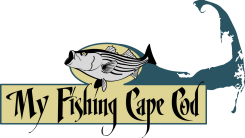This past week I was fortunate to connect with a couple nice schools of striped bass while fishing from shore. You can learn more about those experiences by checking out these two Cape Cod fishing reports from this week:
- Cape Cod Fishing Report June 17 | A Perfect Night On The Beach (Part 1)
- A Perfect Night On The Beach (Part 2)
After publishing those two reports I received several emails asking about tides and how to determine which tides will fish best at a particular beach, bay, harbor, cove or estuary.
Some folks thought that high tide was always the best tide for fishing. Others thought low was best. The truth is that the best tide for fishing varies, depending on where you are fishing.
One beach or bay might fish best at high tide, while another close by is better towards low. In this post I am going to do my best to share with you 3 simple ways to tell which tide fishes best at a particular location.
1) Is There A Gradual Slope To The Beach, Or A Sharp Vertical Slope?
Some beaches on Cape Cod, like the one in the above photo, have a very gradual slope to them. Others, like the below photo, have a vertical slant.
By observing the slope of the beach, you can help determine which tide may fish best.
For most gradually sloped beaches, I like to fish during the lower stages of the tide, because I can walk out onto the flats and sandbars, and cast into the troughs and holes not accessible during the higher stages of the tide.
For most vertically sloped beaches, I like to fish during the higher stages of the tide, because bass will often cruise along the shoreline of vertically sloped beaches,sometimes incredibly close to shore, when the tide is high.
2) Which Stage Of The Tide Offers The Best Feeding Opportunity?
Stripers will often move around and feed in specific ways and areas, according to the stage of the tide. If you can figure out which tide presents bass with the most ideal feeding opportunity, you will instantly increase your odds of success.
For example, in one spot where I like to fish, bass will wait outside of an inlet, until the incoming tide rises high enough for them to flood into the estuary. As soon as the water level reaches a specific height, the fish literally swim by my feet, up into the estuary.
At another location I like to fish, bass take advantage of bait that becomes trapped in troughs and holes during low tide. As soon as the water level rises, the bait disperses, making it more productive to fish these holes during the low.
To figure out which tide offers the best feeding opportunity, use common sense and try to think like a predator. Take a look around at the structure, and imagine what conditions and tide would create the easiest feeding opportunity for a striper.
3) What Tide Makes Fishing Easiest For You As The Angler?
A certain tide may turn on the bite, but it's no use for you as the angler, if you cannot reach those fish due to the stage of the tide. This is especially true when fishing from shore.
For example, fishing the below boulder field from shore at low tide is an absolute nightmare. The slippery seaweed and rocks makes moving around very difficult, and arduous.
Yet at high tide, a slippery boulder field may be completely covered with water, which makes fishing much easier.
Same goes for sandbars and sand flats. If you have trouble walking long distances, then you definitely do not want to try fishing at dead low tide, when open water could be a mile away.
You'll save yourself a lot of headaches if you take this tip into consideration when planning a trip. There's nothing worse than putting in a ton of effort and time to reach a spot, just to realize that you won't be able to fish it until the tide turns, which could be hours away!
What do you think? Let me know by commenting below.
Tight lines and take care,
Ryan







You may check the calendar to find out the date for the day you want to know the high tide for Cape May.
Visit online tide charts on weather websites like NOAA’s or surfline.com to find the time for the high tide in Cape May.
Alternatively, use a paid tide app or subscribe to a local tide book to have access to the tide times in Cape May.
Good article in yesterday’s Boston Globe on Great Whites, hope the link works for you.
http://epaper.bostonglobe.com/epaper/showlink.aspx?bookmarkid=MD07R1VYAZJ8&preview=article&linkid=21c67d2f-9a8f-42e7-8e2c-bd9d143b101a&pdaffid=8UmJTt8C4IDjwKDwM8x%2bcw%3d%3d
Ryan – how do I tag articles on your site? The search function doesn’t work for me and sometimes I don’t want to lose track of some info.
Thanks Jane for the link! Check out this video on this Facebook page of a Great White in Cape Cod Bay, filmed this week when you get a chance https://www.facebook.com/fvcynthiac
I need to work on the search function, because it’s not working for anyone when they are logged into the site. The joys of website tech! lol
Maybe bookmarking pages of interest would be best for now? I will further work on website organization and hierarchy once the season is behind us.
Thanks as always and I hope things are terrific!
Ryan, do you know which beach the great white was spotted from? I fished all over chappy about a week ago and although I fished nights into sunrise I did not see one seal. Plenty of people fishing daylight and there were no complaints of seals from them either. There are huge schools of blues over there maybe the seals are staying off shore with the main body of fish?
Hey Art – it was off Chappaquidick. Here is a link to the photo I was sent. You’ll see the fin pointed via the arrow https://myfishingcapecod.com/wp-content/uploads/2014/06/chappy-great-white-shark-arrow.jpg
Not sure about the seals, but the sharks are around in places where the seals are not. Here’s a link to a video of a GW in Cape Cod Bay shot this week. I know the mate on this boat and they are very legit https://www.facebook.com/fvcynthiac
This is great…my husband fishes and I’m not really in to the patience part so I make a horrible fishing partner. But I’m kind if a science geek and love to learn about well…the science behind it all. The tides, the winds, what the bottom of the ocean looks like to a jig, why the fish do what they do, their feeding habits, how each lure is supposed to act in the water, and all the million factors there are. My husband has some serious patience…I wouldn’t fish unless I had all the facts…lol. I’d really love to be a part of his fishing adventures, even if it’s just having the knowledge to give him a better chance to catch a fish. Can you point me in the right direction(s) to do this?
Hi Meg! I responded to your comment via email. I hope it helps and keep us posted!
Fishing the boulder field and rocks of Maine you do make a great point of the slippery rocks. I’ve found you can get some action 3hrs before high tide right unto after the turnn. Work the white water with shallow swimmers and topwaters to start. Work the rest of the water column as the tide comes in and as it recedes.
Tight Lines to all.
Great advice – thank you Keith
Excellent information. It all makes perfect sense. Now…how do you get rid of seals? LOL.
Hey Brian – I was actually just sent a photo of a great white off the Vineyard, about 30 feet from shore. My guess is that there will be MANY great whites congregating here in future years……..we’ll need ’em too, if we want the seal numbers to go down.
Ha! I was just joking about that in the forum, but I guess that really is the only natural form of population control, great info Ryan, what’s interesting is that the beaches are changing all the time, we fish a beach that has been very productive at a higher tide,there were some drop offs, deep holes and sand bars all close to shore when the water is up. Over the years the beach has lost it’s structure and is now perfectly flat. Many people say the fishing there just isn’t the same but I’m now wondering if we just need to switch tides? Maybe low will give us access to better structure. Might try it Sunday, thanks!
Excellent insight Brian. I’ll be interested in hearing how you do fishing that beach on a different tide. Like you mention, things are always changing.